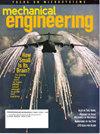准备好了吗?
IF 2.1
4区 工程技术
Q2 ENGINEERING, MECHANICAL
引用次数: 0
摘要
使用3D打印应对疫情的故事使人们关注到增材制造及其快速、灵活生产急需部件的潜力。无论是面罩、鼻咽拭子还是呼吸口罩,增材制造都迎接了挑战,填补了供应链中断造成的空白。现在,一些行业观察人士开始质疑3D打印是否会成为制造业的未来。本文章由计算机程序翻译,如有差异,请以英文原文为准。
Ready for Anything?
Stories of using 3D printing to respond to the pandemic throw a spotlight on additive manufacturing and its potential for fast, flexible production of critically needed parts. Whether it was face shields, nasopharyngeal swabs, or respiratory masks, additive manufacturing rose to the challenge to fill in the gap caused by a disrupted supply chain. Now, some industry observers are starting to ask whether 3D printing could be the future of manufacturing.
求助全文
通过发布文献求助,成功后即可免费获取论文全文。
去求助
来源期刊

Mechanical Engineering
工程技术-工程:机械
CiteScore
0.60
自引率
0.00%
发文量
21
审稿时长
6-12 weeks
期刊介绍:
Information not localized
 求助内容:
求助内容: 应助结果提醒方式:
应助结果提醒方式:


